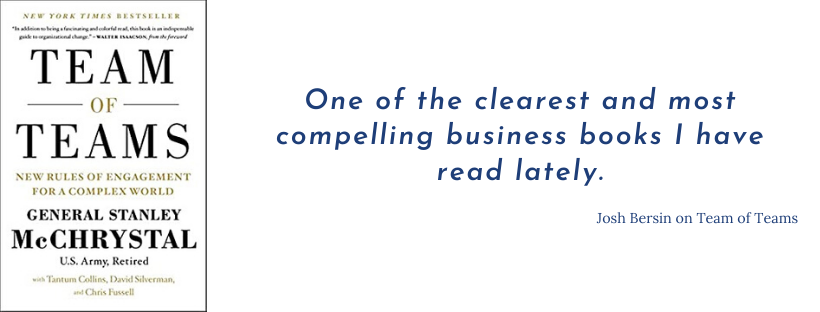Book Review – Team of Teams: New Rules of Engagement for a Complex World
27 May 2020

General Stanley McChrystal is well placed to dispense hard-won wisdom on leadership, organisational structure, teamwork and the most efficacious ways to adapt to the forces at play that affect how an organisation performs. A four-star general with thirty four years’ service in the US Army and the commander of the Joint Special Operations Task Force in Afghanistan in the years after the commencement of the war in Iraq, McChrystal understands the power of a shapeshifting enemy and, in its presence, the powerlessness of even the most well-organised, well-trained of armies.
The Al Qaeda McChrystal and his men confronted in 2004 was not what they expected. It was ostensibly a traditional insurgency they faced, except that it wasn’t: as McChrystal writes, “insurgency, terrorism and radicalisation are as old as conflict itself, but by 2004 these phenomena had been coupled with new technological variables to create an entirely new problem set.” As a result, the Task Force had no choice but to significantly transform. What does this have to do with organisations beyond the context of war? McChrystal explains that although facing an organisation like Al Qaeda in battle is an exceptionally specific scenario, the social and technological changes that made Al Qaeda a force to be reckoned with are applicable to all 21st century organisations.
McChrystal admits that in order to effectively adapt, he had to strip himself of the framework through which he saw war – and the world. And that is what this book is ultimately about. Organisations that cling to inveterate methods, however tested or proven, will not succeed in a rapidly changing landscape. As McChrystal writes, “an organisation must be constantly led or, if necessary, pushed uphill toward what it must be. Stop pushing and it doesn’t continue, or even rest in place; it rolls backward.”
What may sound obvious in generalities and metaphors isn’t in the detail. McChrystal’s source matter is fascinating and wide-ranging. His research, which he conducted alongside Tantum Collins, David Silverman and Chris Fussell, takes his audience to numerous settings in which his argument for adaptation over a myopic focus on efficiency is played out. We are taken to Afghanistan and immersed in his elite counterterrorism force, to the factory floors of the late 19th and 20th centuries, to the operating room of Brigham and Women’s Hospital in the wake of the 2013 Boston Marathon bombing, to the deck of a ship alongside Navy SEAL snipers as they work to save Captain Phillips from Somali pirates, to the launching pad of NASA’s famous Apollo project, to warships along the coast of Japan, and to many more landscapes on which his lessons about teamwork, leadership, and change in response to context are given shape.
Whilst he acknowledges that the findings in this book are not the result of clinical trials, McChrystal’s arguments are convincing, perhaps because they are furnished with, in addition to theory, such interesting and diverse socio-political stories with which most readers will be familiar. That he is the main character in one of these stories, a leader who is fallible and must accept that his approach will not suffice against an ever-changing enemy and in a vastly alien landscape, only gives more clout to Team of Teams’ thesis. Written engagingly and with clarity, McChrystal’s sage advice would be beneficial to any leader.
To our newsletter readers, email through to Julian Fagan at jlfagan@hardygroupintl.com for your chance to win a free copy. First 20 to send through will be successful.

